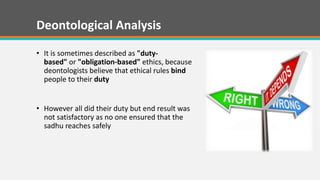The parable of the sadhu
- 1. The parable of the sadhu Animesh Alok (17S506) Kavan Shah (17S523) Priyesh Kannoth (17S539) Sneha Mukherjee (17S548) Vijai Lakshmi (17S560) Section 5 - FAS AA1
- 2. Case facts ? Based on real life incident that happened with Bowen H. McCoy, MD of Morgan Stanley ? On a trip to Himalaya for 60 days ? Once in a lifetime trip; 18,000 feet ? Met people of different nationalities
- 3. Encounter with sadhu leading to ethical dilemma ? One of the New Zealanders found a naked, barefoot body of an Indian sadhu ? He was shivering and suffering from hypothermia ? Everybody did their bit in reviving the sadhu; the New Zealander carried the sadhu, McCoy checked his pulse and suggested treatment for hypothermia, Stephen and the Swiss gave him clothing and got him warmed up, the Japanese gave him food and water, the Sherpas carried him down towards the hut ? However, no one took complete responsibility for the sadhu’s well-being
- 4. Stephen’s arguments ? Stephen says that leaving the Sadhu alone was a breakdown of ethics - that everyone just 'passed the buck‘ ? He insists that this is a typical 'Western' approach to a problem: just throw some material wealth at it and forget about it ? Ponders about how different the action would have been – “Had the person been a well dressed Asian or a Western woman”
- 5. McCoy’s arguments ? At first, McCoy was defensive to Stephen’s arguments ? Things like high adrenaline flow, once in a lifetime opportunity were his excuses ? But later on, he realized how they had ‘walked by an ethical dilemma without appropriate action’
- 6. Ethical Dilemma ? Individual Ethics vs Group Ethics ? Rule based ethical theory ? Deontological Analysis ? Utilitarian Analysis ? Distributive Justice ? Teleological Analysis ? Implementing ethics in corporate world
- 7. Individual vs Group Ethics ? Every person did their bit for sadhu to save him ? However, no one ensured the ultimate well-being of the sadhu ? Where does the individual ethical responsibility of person ends? ? Is there something called Collective or Institutional responsibility?
- 8. Deontological Analysis ? It is sometimes described as "duty- based" or "obligation-based" ethics, because deontologists believe that ethical rules bind people to their duty ? However all did their duty but end result was not satisfactory as no one ensured that the sadhu reaches safely
- 9. Utilitarian Analysis ? Maximum benefit for maximum number of people ? In this case, no person was harmed ? Sadhu was benefitted from the efforts and everyone else also got success in their mission ? But still we can not comment about the final result of their action as it is not clear
- 10. Distributive Justice ? Tenets are ? Maximum freedom for all ? Inequities to be tolerated only when weakest are benefitted ? The case satisfies all the tenets but end result doesn’t seems satisfactory
- 11. Teleological Analysis ? End justifies the means ? What is the end here? ? Completing the once in a life time trip or saving the sadhu? ? Case doesn't specify the ends here specifically, so this analysis is not satisfactory here
- 12. Virtue Theory ? Morally good habits developed through training and repetition ? Moral virtues are traits that enable us to live well Virtue Theory vs Rule Based theory ? Rule based theory are the threshold theory and virtue theory are the optimization theory ? Rule based theory specifies the minimum requirement for any action and virtue theory aims at excellence
- 13. Relevance to corporate world ? How to ensure collaborative effort towards end goal ? Synchronizing individual efforts with collective vision ? Reaching consensus and selecting a leader in crunch situation ? How to ensure group’s support
- 14. Learnings from the parable ? Pose questions to oneself in terms of excellences of character, to facilitate good habits of moral thinking ? These moral good habits act as prevention doses that will help keep business persons out of moral dilemmas in the first place, and will help them sail heroically through those situations in which they might otherwise be tempted by the vices ? In a complex situation, the individual requires and deserves the support of the group. When such a support is provided, a person has a stake in the success of the group ? It will also direct & focus each member of the team & benefit the group as a whole
- 15. Thank you
Editor's Notes
- To change the image on this slide, select the picture and delete it. Then click the Pictures icon in the placeholder to insert your own image.















